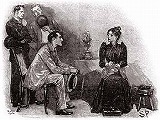“Miss Susan Cushing, living at Cross Street, Croydon, has been made the victim of what must be regarded as a peculiarly revolting practical joke unless some more sinister meaning should prove to be attached to the incident. At two o’clock yesterday afternoon a small packet, wrapped in brown paper, was handed in by the postman. A cardboard box was inside, which was filled with coarse salt. On emptying this, Miss Cushing was horrified to find two human ears, apparently quite freshly severed. The box had been sent by parcel post from Belfast upon the morning before. There is no indication as to the sender, and the matter is the more mysterious as Miss Cushing, who is a maiden lady of fifty, has led a most retired life, and has so few acquaintances or correspondents that it is a rare event for her to receive anything through the post. Some years ago, however, when she resided at Penge, she let apartments in her house to three young medical students, whom she was obliged to get rid of on account of their noisy and irregular habits. The police are of opinion that this outrage may have been perpetrated upon Miss Cushing by these youths, who owed her a grudge and who hoped to frighten her by sending her these relics of the dissecting-rooms. Some probability is lent to the theory by the fact that one of these students came from the north of Ireland, and, to the best of Miss Cushing’s belief, from Belfast. In the meantime, the matter is being actively investigated, Mr. Lestrade, one of the very smartest of our detective officers, being in charge of the case.”
“So much for the Daily Chronicle,” said Holmes as I finished reading. “Now for our friend Lestrade. I had a note from him this morning, in which he says:
“I think that this case is very much in your line. We have every hope of clearing the matter up, but we find a little difficulty in getting anything to work upon. We have, of course, wired to the Belfast post-office, but a large number of parcels were handed in upon that day, and they have no means of identifying this particular one, or of remembering the sender. The box is a half-pound box of honeydew tobacco and does not help us in any way. The medical student theory still appears to me to be the most feasible, but if you should have a few hours to spare I should be very happy to see you out here. I shall be either at the house or in the police-station all day.
What say you, Watson? Can you rise superior to the heat and run down to Croydon with me on the off chance of a case for your annals?”
“I was longing for something to do.”
“You shall have it then. Ring for our boots and tell them to order a cab. I’ll be back in a moment when I have changed my dressing-gown and filled my cigar-case.”
A shower of rain fell while we were in the train, and the heat was far less oppressive in Croydon than in town. Holmes had sent on a wire, so that Lestrade, as wiry, as dapper, and as ferret-like as ever, was waiting for us at the station. A walk of five minutes took us to Cross Street, where Miss Cushing resided.
It was a very long street of two-story brick houses, neat and prim, with whitened stone steps and little groups of aproned women gossiping at the doors. Halfway down, Lestrade stopped and tapped at a door, which was opened by a small servant girl. Miss Cushing was sitting in the front room, into which we were ushered. She was a placid-faced woman, with large, gentle eyes, and grizzled hair curving down over her temples on each side. A worked antimacassar lay upon her lap and a basket of coloured silks stood upon a stool beside her.

“They are in the outhouse, those dreadful things,” said she as Lestrade entered. “I wish that you would take them away altogether.”